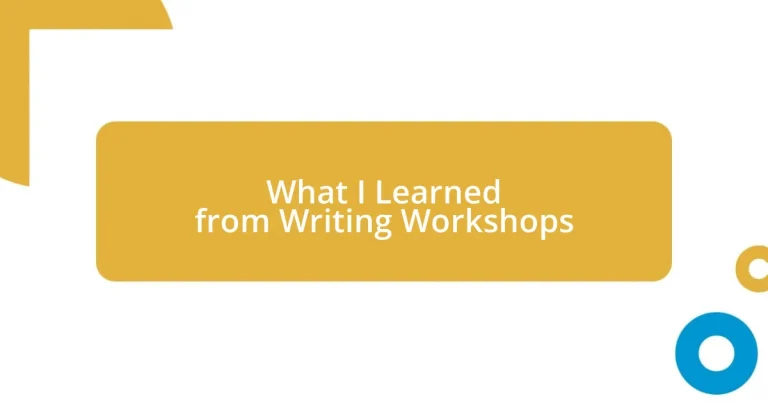Key takeaways:
- Writing workshops provide a supportive environment for aspiring writers to receive constructive feedback and explore diverse perspectives, enhancing their craft.
- Key benefits include improved creativity, accountability, and confidence, as sharing work fosters connection among participants.
- Common features like feedback sessions, creative exercises, and structured accountability help participants navigate writing challenges effectively.
- Lessons learned from workshops, such as freewriting and goal-setting, significantly transform the writing process and nurture a positive relationship with one’s craft.
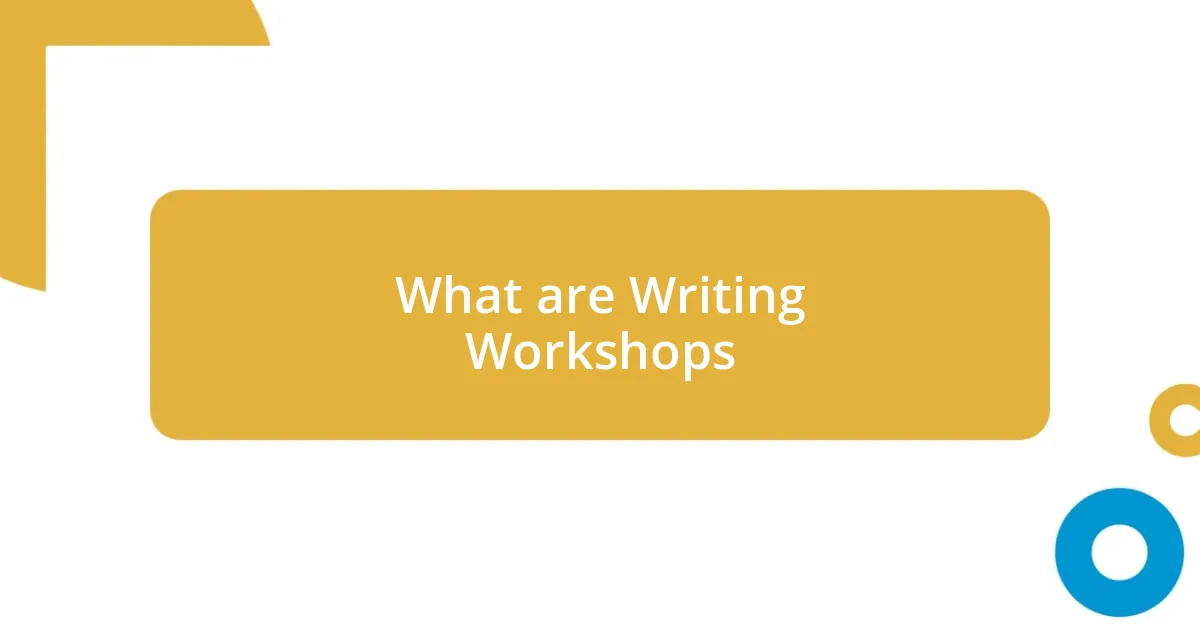
What are Writing Workshops
Writing workshops are collaborative spaces where aspiring writers gather to enhance their craft. I remember attending my first workshop, feeling a blend of excitement and nervousness. Did you ever wonder how it feels to share your work with others? For me, it was transformative, turning anxiety into motivation as I received feedback from fellow writers.
These workshops often involve critique sessions, prompting participants to provide insights on each other’s work. It’s a supportive environment where you can explore your writing style and voice. I was amazed at how varied the perspectives were, and I learned so much just by listening to others discuss their own challenges and triumphs. Isn’t it fascinating how each story told can illuminate a different aspect of the writing journey?
In addition to critiques, many workshops offer guided exercises and prompts designed to spark creativity. I found myself writing pieces I never thought I’d explore, like poetry and flash fiction. Have you ever stepped outside your comfort zone? That’s exactly what these workshops encourage, pushing you to break free from the familiar and discover new facets of your writing potential.
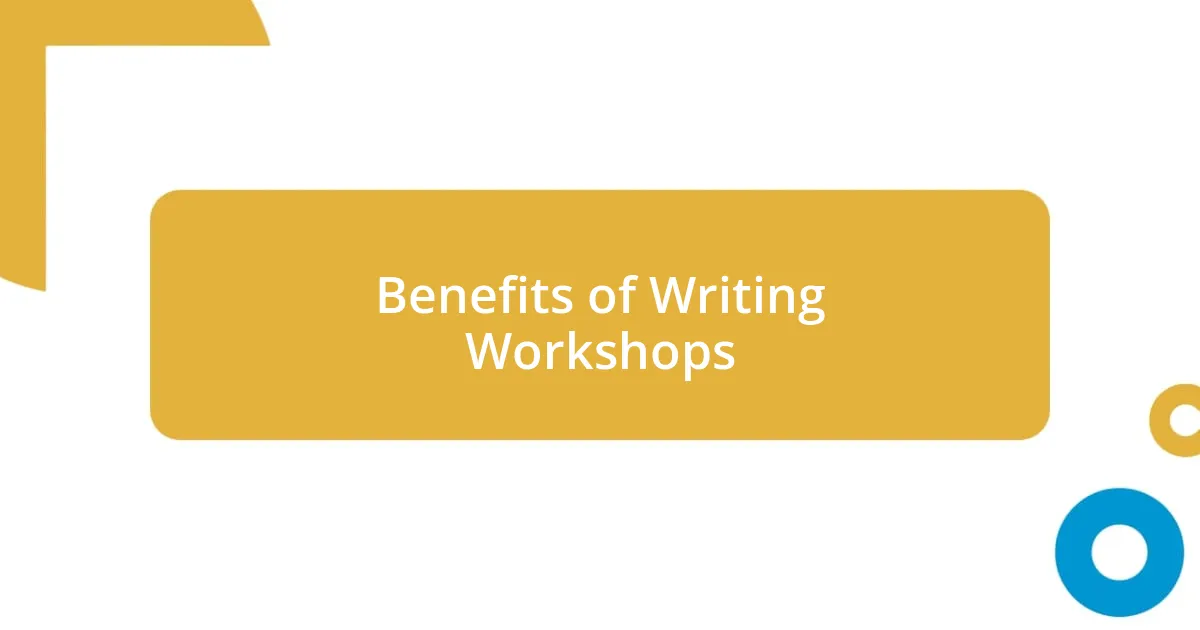
Benefits of Writing Workshops
Participating in writing workshops has opened my eyes to the profound benefits they offer. I vividly remember one session where a fellow writer shared her work—a raw and emotional piece about loss. The way the group responded, with such thoughtful comments and shared experiences, created a bond that deepened my understanding of the human connection in storytelling. It’s remarkable how a simple gathering can foster such a sense of community and validation.
Here are some key benefits of writing workshops:
- Constructive Feedback: Receiving detailed insights from peers helps refine your writing.
- Diverse Perspectives: Sharing with others introduces you to various writing styles and ideas.
- Enhanced Creativity: Engaging with different prompts can spark creative breakthroughs.
- Accountability: Regular meetings encourage consistent writing habits.
- Confidence Building: Sharing your work in a supportive space boosts self-esteem and courage in your writing journey.
I can still recall the thrill of reading my piece aloud for the first time in a workshop. Adrenaline coursed through me, but the encouragement I received afterward made me realize how valuable it is to be part of this nurturing environment. Writing, at its core, is about connection, and workshops create the perfect backdrop for that discovery.
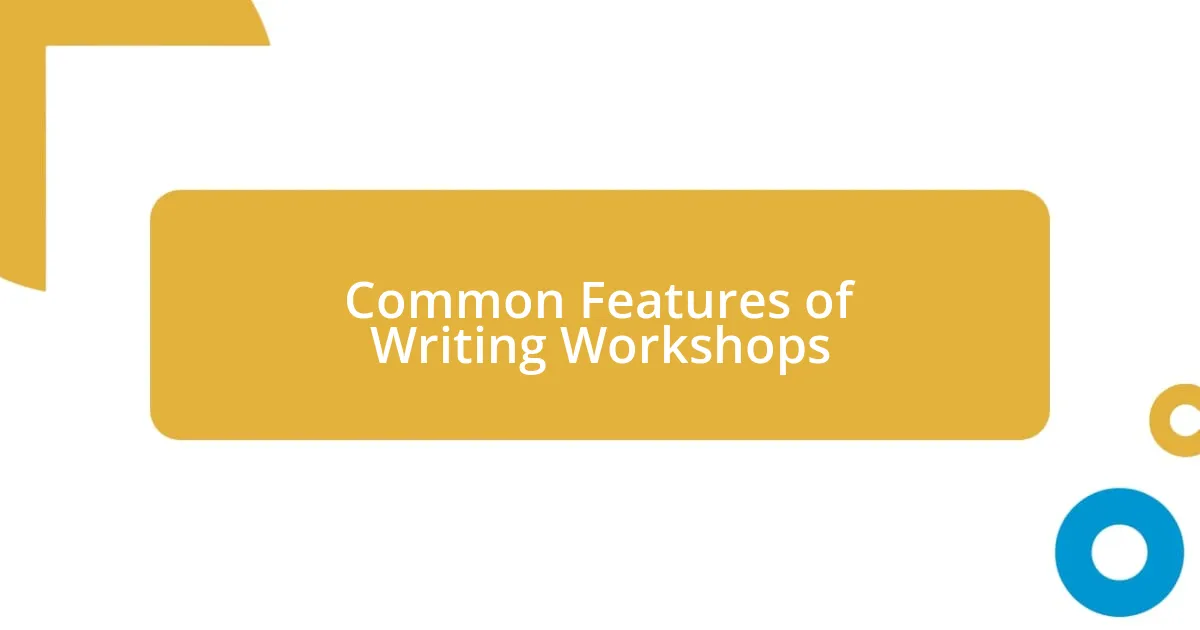
Common Features of Writing Workshops
I’ve noticed that every writing workshop I’ve attended shares some common features that really shape the experience. One of the standout elements is the presence of feedback sessions. It’s not just about receiving comments; it’s an opportunity to engage in meaningful dialogue about each other’s work. I remember a moment when a participant offered a perspective that completely reframed my understanding of my own story. That kind of interaction adds depth to the process and fosters a sense of camaraderie among writers.
Another typical feature involves structured exercises to stimulate creativity. These can range from free writing to specific prompts that challenge you to think outside the box. One day, I was given a prompt about a forgotten object. It led me to write a piece about an old typewriter I found in my grandmother’s attic—a memory I hadn’t thought about in years. These exercises can truly awaken your imagination, often unearthing stories I never knew were lurking beneath the surface.
Lastly, workshops often cultivate a sense of accountability. I remember that after signing up, I felt a sudden urgency to write regularly, as I didn’t want to show up empty-handed. This commitment to each other is what keeps the writing community vibrant and alive. I think we all thrive when we have a shared goal, don’t you?
| Feature | Description |
|---|---|
| Feedback Sessions | Interactive discussions aimed at providing constructive critiques on each other’s work, fostering connections. |
| Creative Exercises | Structured prompts and activities designed to spark inspiration and encourage exploration of different writing styles. |
| Accountability | Regular meetings help maintain writing habits and offer support from fellow participants. |
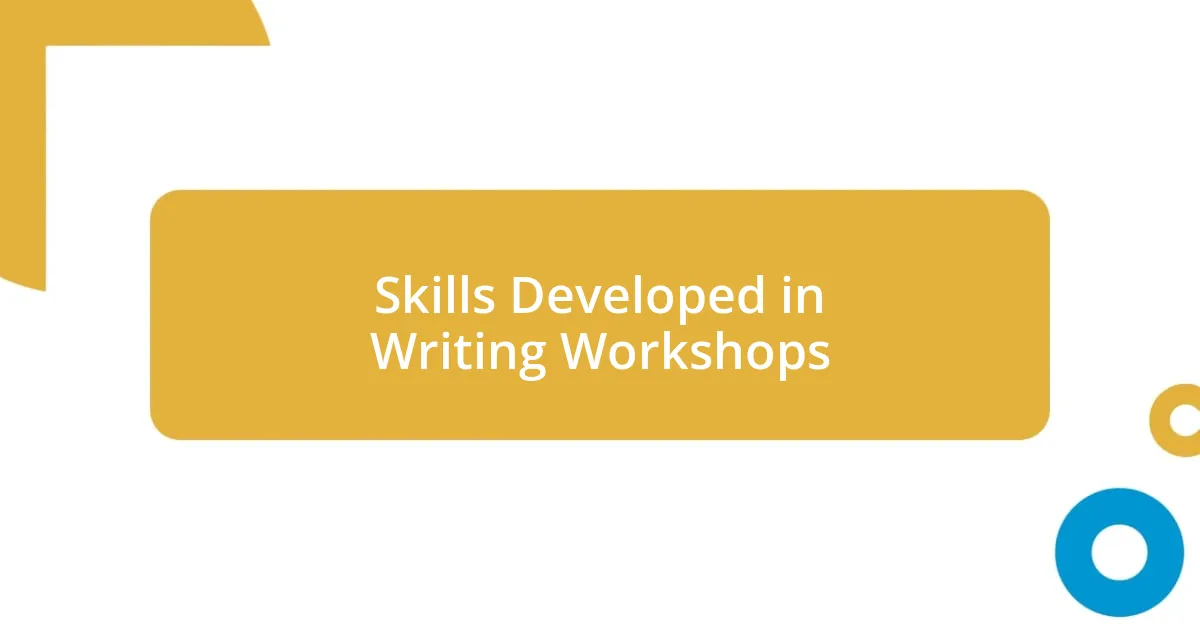
Skills Developed in Writing Workshops
In writing workshops, one of the most rewarding skills I developed was the art of constructive criticism. Attending my first workshop, I felt nervous about providing feedback, but I soon realized that thoughtful critiques could be truly transformative. I remember suggesting a slight change to a fellow writer’s character development, and seeing the delight in her eyes as she recognized the potential in my suggestion made me appreciate how powerful our words can be when shared with empathy and care.
Another significant skill that flourished was my ability to embrace diverse perspectives. One workshop featured a participant whose distinct experimental style was unlike anything I had encountered before. At first, I was skeptical, but as I began to explore her methods, I found my own writing evolving in unexpected ways. This exposure fueled my creativity and opened my mind to the idea that there’s no singular right way to tell a story—each voice adds a unique thread to the tapestry of literature.
Finally, I can’t overlook how workshops helped build my confidence in sharing my work. Initially, I was hesitant to let anyone read my stories, fearing judgment. However, after a few supportive sessions, I felt a shift. I vividly recall the moment when I shared a deeply personal piece about my childhood. The vulnerability was palpable, yet the warmth and encouragement from my peers made me realize that sharing our truths is not just an act of bravery—it’s a vital part of the writing journey. Isn’t it fascinating how community can transform our fears into strength?
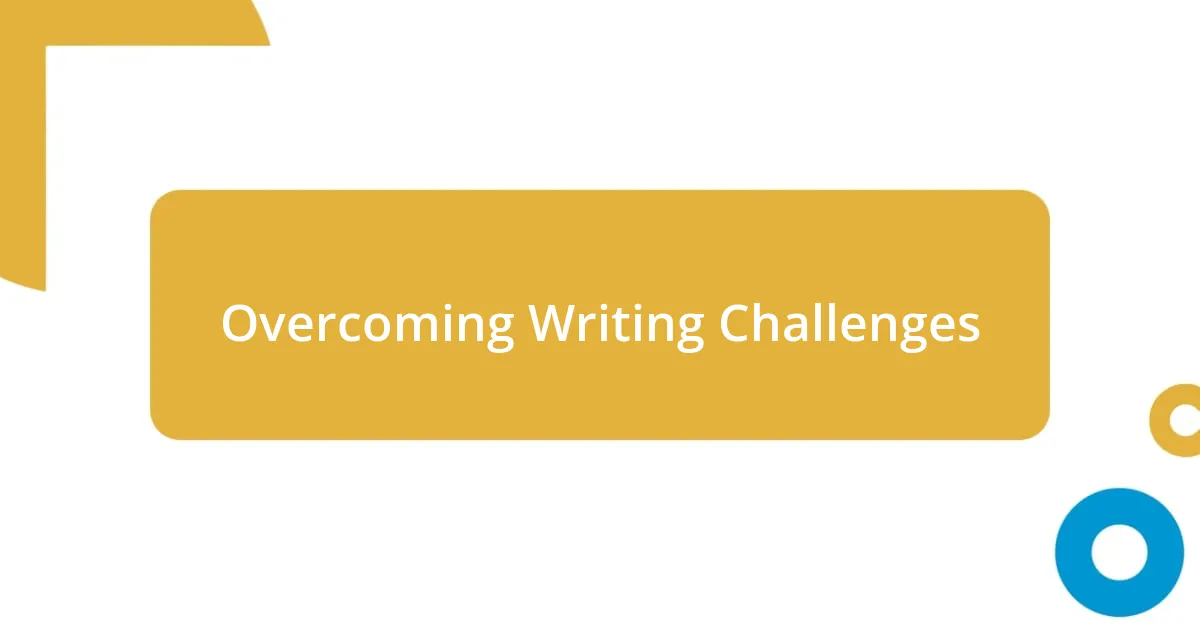
Overcoming Writing Challenges
Navigating the hurdles of writing can sometimes feel insurmountable, but workshops have equipped me with strategies to push through those obstacles. I remember encountering a particularly stubborn case of writer’s block during one session. The facilitator suggested a technique that involved shifting my focus—writing with my non-dominant hand. The clumsiness of it sparked a creative flow I hadn’t experienced in ages, leading to unexpected ideas and breakthroughs.
Another challenge many writers face is the fear of exposing their work to even mild criticism. I felt that anxiety too, especially when sharing stories that felt personal and raw. Yet, during a particularly poignant feedback session, one writer shared how my piece resonated deeply with her own life experiences. That moment reminded me that vulnerability often connects us more than we think; the fear that held me back transformed into a bridge to deeper understanding and connection with others.
Moreover, time management often proves to be a significant challenge for aspiring writers. I struggled with balancing my writing ambitions and daily responsibilities until a workshop introduced me to the concept of “micro writing.” Setting aside just ten minutes a day created a manageable entry point for my creativity. It was astonishing to see how those small snippets accumulated into substantial progress. Isn’t it amazing how sometimes, a simple shift in perspective can unlock the potential lurking in our busy schedules?
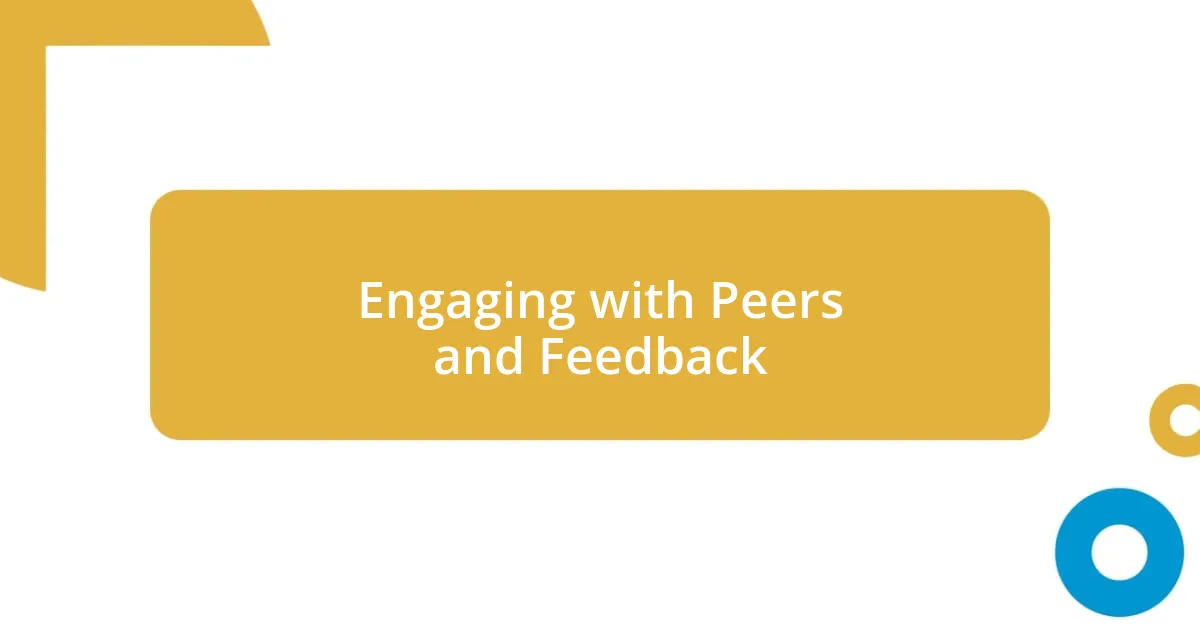
Engaging with Peers and Feedback
Engaging with peers in writing workshops offered me a treasure trove of insights. I vividly remember a session where we paired up for feedback, and my partner provided genuine reflections on my narrative voice. Her comments, particularly about where I could inject more emotion, were spot on and sparked a light bulb moment for me. It’s intriguing how an outsider’s perspective can highlight nuances I might have missed. Have you ever realized that what seems obvious to you might be entirely overlooked by someone else?
Feedback, when given and received thoughtfully, becomes a lifeline for growth. One time, a fellow participant courageously shared their struggle with character authenticity, and I felt compelled to dig deeper. I offered suggestions, and in return, he posed questions that made me rethink my own characters. That back-and-forth exchange was more than just words—it felt like a mini masterclass, blending our strengths and weaknesses into a profound learning experience. Isn’t it incredible how engaging with others can enrich our understanding of ourselves?
Looking back, some of the most valuable moments came from hearing my peers’ stories about their writing journeys. These narratives often resonated deeply, reflecting not only challenges but also triumphs. I recall a moment when someone shared how a particular piece transformed their life, sparking a conversation about the cathartic power of writing. I couldn’t help but wonder: how often do we forget that our voices matter? That connections forged in these settings can ignite new pathways for all involved?
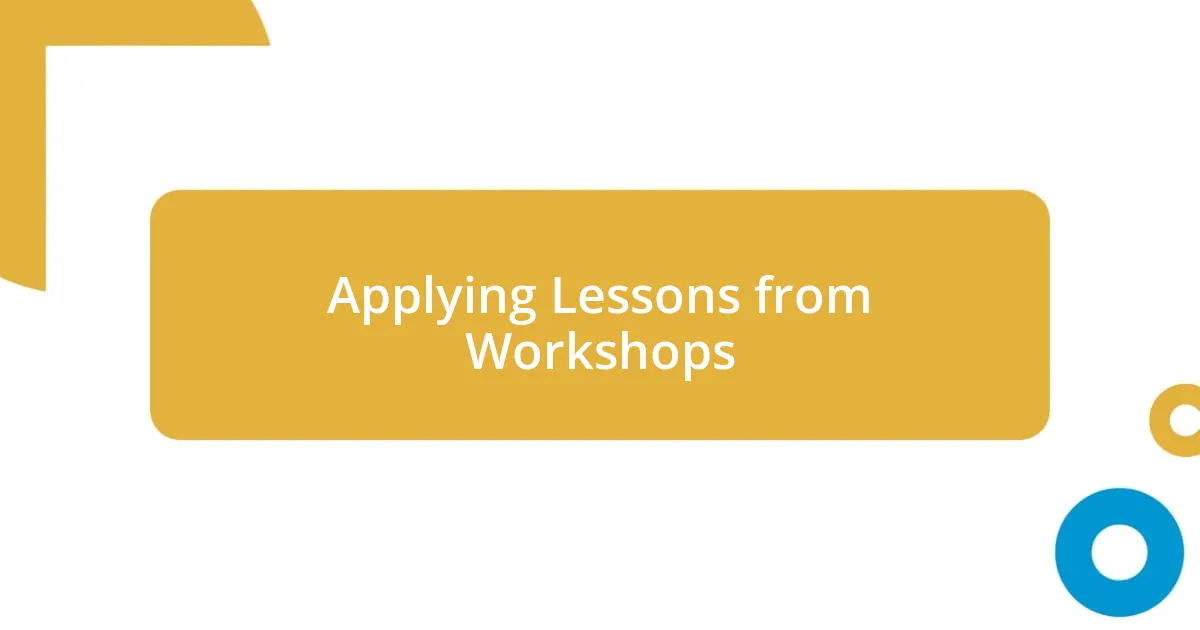
Applying Lessons from Workshops
Applying lessons from workshops has truly transformed my writing process. One technique that has stuck with me is the practice of freewriting. I remember sitting down after a workshop and allowing my thoughts to spill onto the page without judgment. The freedom of it was exhilarating! Have you ever let yourself just write without worrying about how it sounds? This approach not only helped clarify my ideas but also unearthed hidden gems within my creative mind that structured writing often obscured.
There’s also the invaluable lesson of setting specific goals. Inspired by a peer’s determination during a workshop, I decided to challenge myself by outlining a full chapter in just one week. The thrill of meeting that deadline pushed me to stay focused and made the entire writing process feel more achievable. Have you ever committed to a goal and felt that rush of accomplishment? I found that the excitement of reaching milestones can reignite passion for writing, reminding me of the joy that prompted my journey in the first place.
Equally important is the reminder to celebrate progress, no matter how small. After a particularly intense workshop, I took a moment to reflect on my growth. I realized that even minor improvements, such as refining my dialogue or enhancing my descriptions, deserved recognition. This shift in perspective nurtured a kinder relationship with my writing journey. Isn’t it fascinating how perspective can reshape our experiences? By acknowledging each step forward, I cultivated resilience, making the writing path not just bearable but enjoyable.












